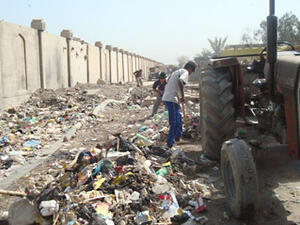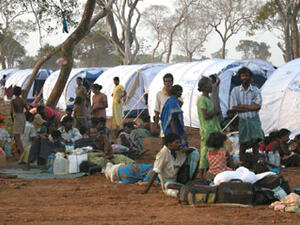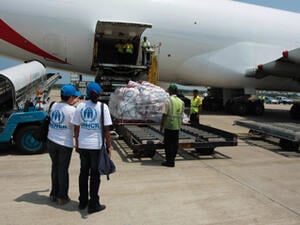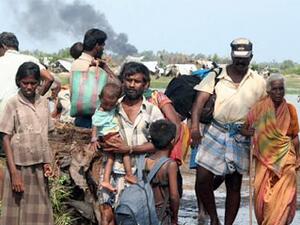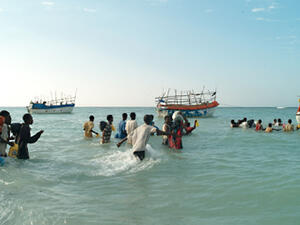Child's death highlights refugees' plight on Iraq-Jordan border
Child's death highlights refugees' plight on Iraq-Jordan border
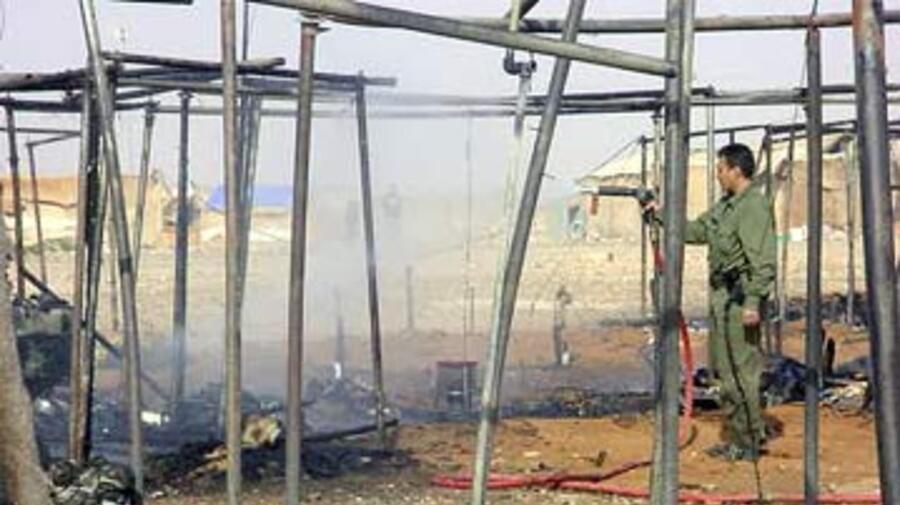
Putting out the fire at Ruweished camp, which houses 123 Palestinian refugees from Iraq.
RUWEISHED, Jordan, April 15 (UNHCR) - In the wake of a tragic fire that killed a three-year-old toddler and inflicted severe burns on two other Palestinian refugees, senior UNHCR staff have travelled to Ruweished camp to hold talks with the refugees who have been stranded there for almost two years after fleeing Iraq in the aftermath of the war.
"They're very upset, very bitter - and understandably so," said UNHCR's Representative in Jordan, Sten Bronee, after returning to the capital, Amman, on Thursday. "They're bitter about what they see as lack of support from governments in the region, and, for that matter, governments outside the region. They're upset because they think they're the victims of all the wider issues relating to Palestinian refugees in the Middle East, which have made it so hard to find a solution for them. They feel that if their situation here had been resolved, as it should have been by now, this little girl would still be alive."
Aya Lowai Awni Wahdan, though born in Baghdad, had spent the majority of her short life in Ruweished, a bleak tent camp some 60 km inside Jordan that is currently housing 123 Palestinians who were formerly refugees in Iraq. The camp is frequently buffeted by violent winds and sandstorms. It also suffers from savage heat in the summer months and extreme cold at night and sometimes, in winter, during the day as well. The Jordanian authorities, UNHCR and other agencies provide basic services, including food, but it is no place to bring up a child.
At 8 am last Saturday, a fire - believed to have been caused by an electrical short-circuit - broke out in a neighbouring tent and, swept by a strong wind, in a matter of seconds engulfed three other tents, including the tent housing Aya's family.
All four tents were completely destroyed by the brief inferno, leaving Aya dead, her mother Salafah and one of their neighbours suffering from severe burns, and three others, including Aya's five-year-old brother, suffering from the effects of smoke inhalation.
It was not the first time a fire had broken out at Ruweished - others have been caused by overturned stoves or kerosene lamps. But it was the first time one of the residents had been killed.
The refugees in Ruweished - mainly well-educated middle-class families - have tried to improve their living conditions by fixing up their own unofficial electrical supplies, and it is believed that one of these fixtures caused the initial fire.
UNHCR staff working in Ruweished have noted increased tension in the camp, even before the fire. That has now been crystallised by the tragic death of little Aya, Bronee said. Their resentment against all those who could step in to solve their predicament, but do not, is increasingly directed at the staff of UNHCR and its partners working in the camp.
"It's natural," said Bronee. "We're their interface with the outside world - and the outside world is ignoring them. I constantly ask myself: Couldn't we do more? After all it's our job to find solutions for refugees. But we're dependent on a state, or states, to break the ideological and political deadlock here. So far, no state has been prepared to step forward to provide them with a solution, even to get them out of this hellish situation temporarily, with the exception of Jordan which allowed 384 Palestinians men and children with Jordanian spouses and mothers into the country in 2003."
He added, "We've tried hard, particularly with the states in the region, we've pleaded the humanitarian case. But the issues and politics surrounding Palestinian refugees are so entrenched. They asked me why can't they be treated more like other, non-Palestinian refugees? And I just can't give them a satisfactory answer."
The refugees are adamant they do not want to return to Baghdad, where they felt extremely insecure following the fall of the Saddam Hussein regime. Some Iraqis felt the Palestinians received favourable treatment, most notably in the form of low rents (at the expense of Iraqi landlords rather than the government), and once the regime collapsed, some Palestinians were targeted for reprisal. Many others were evicted from their homes.
The Palestinians in Ruweished are one of three groups living out a similar nebulous existence at or near the Iraqi border. A second bigger camp exists in the no man's land between the two countries. This contains a further 49 Palestinians (including the uncle of the little girl burned to death in Ruweished), 641 Iranian Kurds and 59 other people of various nationalities.
The Iranian Kurds are from Al Tash camp, close to Ramadi in central Iraq. Al Tash had housed some 12,000 Iranian refugees for more than 20 years, up until the 2003 war. Since then it has been affected by the instability in the Ramadi area, and many of the refugees have left the camp. Around 4,500 are thought to have returned home to Iran, another 3,000 decided to move up to northern Iraq (where they have mostly settled in the Sulaymaniyah area), and a total of around 1,200 headed for Jordan. Approximately 3,500 remain in Al Tash.
A total of 386 were resettled, in two groups, from the No Man's Land Camp to Sweden at the end of 2004. Another 23 have been resettled to Ireland. Apart from Jordan itself, Sweden and Ireland are the only two countries that have so far come to the aid of the stranded people on the Iraq-Jordan border.
A third group, consisting of 206 Iranian Kurds - also mostly from Al Tash - are living in even more difficult conditions right at the border, but on the Iraqi side. This group, which includes around 85 women and at least 14 children under the age of three, mostly arrived in January but have not been permitted, despite UNHCR's requests, even to enter the No Man's Land camp.
UNHCR, which has been unable to access the group from within Iraq because of the dangers of travelling the road from Baghdad to the border, has managed on three occasions to bring them supplies from the Jordanian side. The most recent was on April 12 when, along with its partner the Jordanian Hashemite Charity Organisation, UNHCR delivered 48 parcels containing a number of different food items, as well as products for personal hygiene.
On the previous visit in March, 100 mattresses, jerry cans, hygiene kits, diapers, full cream milk, sardines and other food and non-food items were delivered. The group has also been lent three rooms by the Iraqi border guards, but apart from these interventions, has been largely dependent on hand-outs from passers-by. The group included five pregnant women, two of whom had to deliver their babies at the border post.
By Rupert Colville



